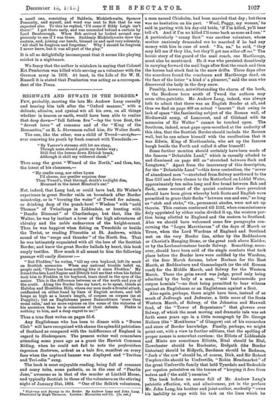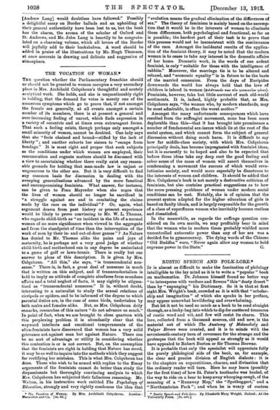HIGHWAYS AND BYWAYS IN THE BORDER.* FEW, probably, meeting the
late Mr. Andrew Lang casually
and hearing him talk after the "Oxford manner," with a delicate, allusive, and cynical wit all his own, on all things whether in heaven or earth, would have been able to realize that deep down—" full fathom five "—lay the true Scot, the "devout lover" of romance and of the "King of the
Romantics," as R. L. Stevenson called him, Sir Walter Scott. The one, like the other, was a child of Tweed—a6rdxecov- ever renewing his youth by fresh contact with Tweedside :— " By Yarrow's streams still let me stray, Though none should guide my feeble way ; Still feel the breeze down Ettrick break, Although it chill my withered cheek."
Thus sang the great " Wizard of the North," and thus, too, the latest of his clansmen,— "My cradle song, nor other hymn
I'd choose, nor gentler requiem dear Than Tweed's, that through death's twilight dim, Mourned in the latest Minstrel's ear."
Not, indeed, that Lang had, or could have had, Sir Walter's experience in great Border raids on horseback after Border minstrelsy, or in " burning the water" of Tweed for salmon, or drinking deep of the punch-bowl " Wisdom" with "auld
Thomas" of Twiselhope in Liddesdale, or hunting with " Dandle Dinmont" of Charlieshope, but that, like Sir Walter, he was by instinct a lover of the high adventures of chivalry and the noble endeavours of the knight-errant. Thus he was happiest when fishing on Tweedside or beside the Teviot, or reading Pitscottie at St. Andrews, within sound of the " surge and thunder " of the North Sea. That he was intimately acquainted with all the lore of the Scottish Border, and knew the great Border ballads by heart, this book amply testifies. How much it all meant to him the following passage will easily discover :-
" But Flodden," he writes, "till my own boyhood, left its mark on Scottish memories. When any national trouble befell us, people said, There has been nothing like it since Flodden.' My friend the late Lord Napier and Ettrick told me that when his father took him to Flodden in his boyhood, tears stood in the eyes of the senior. This is the difference between us of the north and you of the south. Along the Border line my heart, so to speak, bleeds at Halidon and Homildon Hills, where our men made a frontal attack, outflanked on either hand by lines of English archers, and left heaps as high as a lance's length, of corpses on corpses (as at Dupplin); but an Englishman passes Bannockburn ` more than usual calm,' and no more rejoices on the scene of the victories of his ancestors than he is conscious of their defeats. Pinkie is nothing to him, and a deep regret to us !"
Thus a true Scot writes on pages 55-6.
Any Englishman who has been to dinner with a "Burns Club" will have recognized with shame the splendid patriotism of Scotland as compared with the indifference of England in regard to Shakespeare. The present writer well remembers attending some years ago as a guest the Hawick Common Riding, when he could not fail to note the perfervidum ingenium Scotorum, ardent as a bale fire, manifest on every face when the captured banner was displayed and " Teribus and Teri-odin " sung.
The book is most enjoyable reading, being full of romance and many tales, some pathetic, as in the case of "Pearlin Jane," awesome as in that of the murder at Linthill House, and typically Scottish in those of the volunteers on the stirring night of January 31st, 1804. " One of the Selkirk volunteers,
• MI/be-nye and Bymays in the Border. By Andrew Lang and John Lang. Illustrated by Hugh Thomson. London : Macmillan and Co. [5s. net.] a man named Chisholm, had been married that day ; but there was no hesitation on his part. Weel, Peggy, my woman,' he said in parting with his day-old bride, 'if I'm killed, ye'll hear tell o't. And if I'm no killed I'll come back as fume as I can.' " A particularly "canny Scot" was another volunteer, whose mother anxiously demanded ere he marched if he had any money with him in case of need. "Na, na," ho said, " they may kill me if they like, but they'll get nae Biller off me." The heroic story of the guard of the mail coach, one MacGeorge, must also be mentioned. He it was who persisted dauntlessly in carrying forward the mail bags after first the coach and then the horses had stuck fast in the snow drifts. Three days after the searchers found the coachman and MacGeorge dead, on the face of the latter " a kind o' a pleasure," said the man who discovered the body in the deep snow.
Possibly, however, notwithstanding the charm of the book, to the Borderer born south of Tweed the authors may seem ultra-patriotic. Mr. Andrew Lang, indeed, was always loth to admit that there was an English Border at all, and thus we find on page 409 an actual " lament " that owing to lack of space " the fascinating subject of the Roman wall, of Birdoswald camp, of Lanercost, and of Gilsland with its memories of Sir Walter " cannot be touched upon. The Southron, indeed, must gape open-mouthed at the audacity of this idea, that the Scottish Border should include the Roman wall, but he can solace himself with the recollection that it was Edwin, King of Northumbria, who set up the famous burgh beside the Forth and called it after himself !
Some further mention should certainly have been made of the famous "Debatable Land," which is casually alluded to and dismissed on page 403 as " stretched between Sark and Longtown." Apart from the inaccuracy of this description, for the " Debatable Land "—this terra contentiosa, the " sewer of abandoned men "—stretched from Solway northward to the Rae Gill and down thence to the Rutterford on Liddel Water, approximately ten miles long and five broad between Esk and Sark, some account of the quaint customs there prevalent should have been given whereby both Scots and English were permitted to graze their flocks " between sun and sun," so long as " stob and stake," viz., permanent abodes, were not set, up therein. This custom continued till 1552, when commissioners duly appointed by either realm divided it up, the western por- tion being allotted to England and the eastern to Scotland. Also we should have welcomed some few paragraphs con- cerning the "Leges Marchiarum" of the days of March or Truce, when the Lord Wardens of England and Scotland met on the very Border line, either by the Reddanburn or Cheviot's Hanging Stone, or the great rock above Kielder, or by the Lochmabenstane beside Solway. Something, more- over, should have been said of the single combats that took place before the Border laws were codified by the Wardens, at the four March forums, below Norbam for the East March, at Reddanburn and Gammelspath (or the old Roman road) for the Middle March, and Solway for the Western. March. There the grim sword was judge, proof only being admitted by the body of a man, "nisi tantummodo per corpus hominis "—no Scot being permitted to bear witness against an Englishman or an Englishman against a Scot.
Also again, perhaps, there might have been, instead of so much of Jedburgh and Jedwater, a little more of the Scots Western March, of Solway, of the Johnston and Maxwell feud, of the "Tower of Repentance" that glowers over Solway, of which the most moving and dramatic tale was set forth some years ago in a little monograph by Dr. George Neilson (the " Monkbarns " of Glasgow) out of his researches and store of Border knowledge. Finally, perhaps, we might point out, with a view to further editions, that the spelling of proper names is somewhat careless; the Elliots of Liddesdale and Minto are sometimes Elliott, Eital should be Etal, Itowchester should be Rochester, Redpath (the Border historian) should be Ridpath, Reedman should be Redman, " Jock o' the cow " should be, of course, Dick, and Sir Robert Umphraville should be Umfreville, " Robin Mendmarket" of the great Umfreville family that held Tynedale and Redesdale per regalem potestatem on the tenure of "keeping it free from wolves and (' the auld ') enemies."
The book before us seems full of Mr. Andrew Lang's patriotic affection, wit, and allusiveness, yet in the preface Mr. John Lang, his brother and joint-author, modestly " owns his inability to cope with his task on the lines which he [Andrew Lang] would doubtless have followed." Possibly a delightful essay on Border ballads and an upholding of their general authenticity have been lost to us, but the book has the charm, the aroma of the scholar of Oxford and St. Andrews, and Mr. John Lang is heartily to be congratu- lated on a charming volume, which all lovers of the Border will joyfully add to their bookshelves. A word should be added in praise of the illustrations by Mr. Hugh Thomson, at once accurate in drawing and delicate and suggestive of atmosphere.



























































 Previous page
Previous page